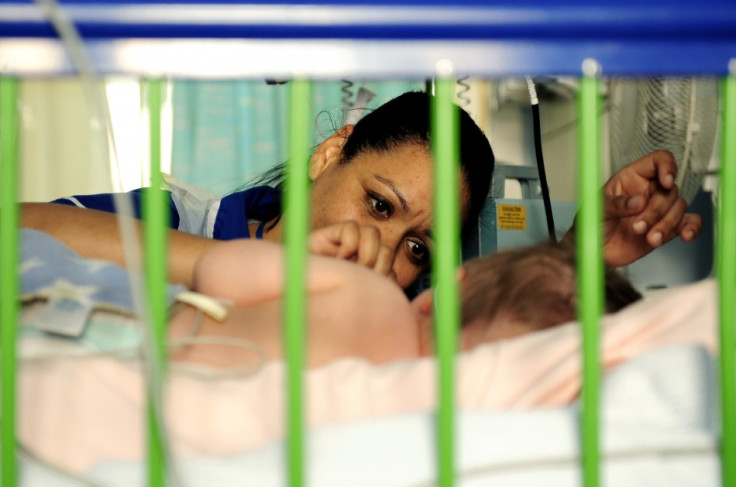Religious Belief in 'Miraculous Intervention' Causing Sick Children to Suffer Needlessly, Doctors Warn
Parents' belief in miracle to save terminally sick child extends suffering

Terminally ill children are being made to suffer needlessly because of their religious parents' belief in miracles, a study warns.
A study has raised concerns that religious faith is causing parents to insist on the continuation of aggressive treatment on a child who is unlikely to recover.
In an argument published in the Journal of Medical Ethics, written by intensive care doctors and a chaplain from London's Great Ormond Street hospital, it is argued that the ethics and legality of faith and treatment decisions need to be reviewed.
The study is based on an assessment of 203 cases involving terminally ill children, 17 of which led to doctors and parents clashing over the best way to proceed with treatment.
The parents called for treatment to continue, while doctors pointed to overwhelming medical evidence that it should be withdrawn.
In 11 cases, the parents directly expressed religious claims that intensive care should not be stopped in case of a miracle or divine intervention and claimed that the medical team was overly pessimistic.
The parents involved were members of a variety of faiths including Christian fundamentalism, Islam, Judaism and Roman Catholicism.
Five cases were resolved following meetings with religious leaders outside the hospital, while a high court order was required in one case to withdraw treatment.
Five cases were not resolved and treatment continued. Four of the children died and one survived with a serious mental disability.
While the authors emphasise that a parent's reluctance to withdraw treatment is "completely understandable as [they] are defenders of their children's rights and life", they argue that when children are too young to subscribe to their parent's beliefs, those beliefs should not be the determining factor in a tratment decision.
No dignity or privacy
"Spending a lifetime attached to a medical ventilator, having every bodily function supervised and sanitised by a carer or relative, leaving no dignity or privacy to the child and then adult, has been argued as inhumane," they claim.
They conclude: "It is time to reconsider ethical and legal structures and facilitate rapid default access to courts in such situations when the best interests of the child are compromised in expectation of the miraculous."
In an accompanying commentary, the journal's editor, Prof Julian Savulescu, argues: "Treatment limitation decisions are best made, not in the alleged interests of patients, but on distributive justice grounds."
He claims that, in a publicly funded system, its limited resources should be given to those whose lives can be saved rather than those who are unlikely to survive.
"Faced with the choice between providing an intensive care bed to a [severely brain-damaged] child and one who has been at school and was hit by a cricket ball and will return to normal life, we should provide the bed to the child hit with the cricket ball."
Limits of parental choice
Dr Mark Sheehan, Oxford BRC ethics fellow, argues that religion is a "red herring" in an argument focused on the limits of parental choice over the care of their children.
He writes: "The attitudes of a university-educated Roman Catholic in middle-class England to the use of contraception is likely to be vastly different from that of an uneducated poor Roman Catholic in rural Nigeria - and this is in spite of the fairly clear Church doctrine on the issue."
He adds: "What matters is that, like the blood transfusion case [in which Jehovah's witnesses refuse tranfusions for their children], society has judged that there are no reasons (religious or otherwise) that warrant failing to transfuse children. Polarising claims about religion are unproductive."
Charles Foster, of the University of Oxford, argues that the paper has asked the wrong question and should focus on the legal and ethical position that "no beliefs, religious or secular, should be allowed to stonewall the best interests of the child".
He writes: "[The authors] seem to think that because we are becoming a more secular society, there is some sort of democratically ordained mandate to impose secular values on everyone.
"That is a parody of the respect for self-determination that is at the root of all decent secular societies. An Orthodox Jew's refusal to consent to the withdrawal of life-sustaining treatment from a child is a refusal that a truly secular society, rejoicing in diversity, should be keen to respect, so long as it is consistent with the best interests of the child, as broadly viewed."
Dr Steve Clarke, of the institute of Science and Ethics, criticises the paper for its position of certainty that miracles do not occur.
"But they are in no position to insist that miracles never happen," he writes. "They do not demonstrate that miracles are impossible and indeed this would be very difficult for them to do given there are significant scholarly arguments for the conclusion that miracles are possible."
Clarke argues that doctors should engage devout parents on their own terms and persuade them via their beliefs that "waiting indefinite periods of time for a miracle to occur while a child is suffering, and while scarce medical equipment is being denied to other children, is not the right thing to do".
© Copyright IBTimes 2025. All rights reserved.





















